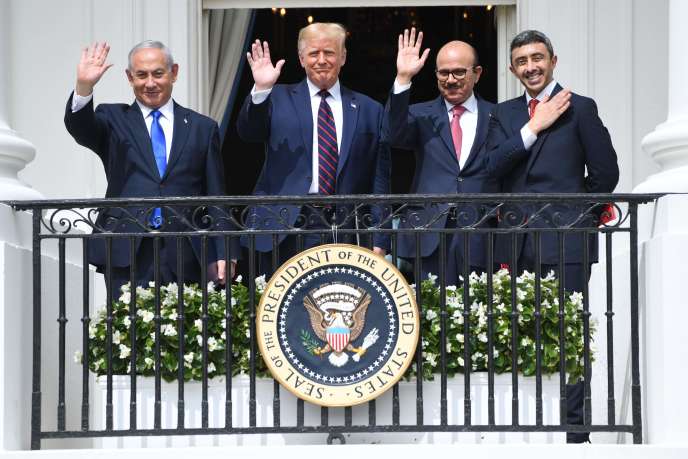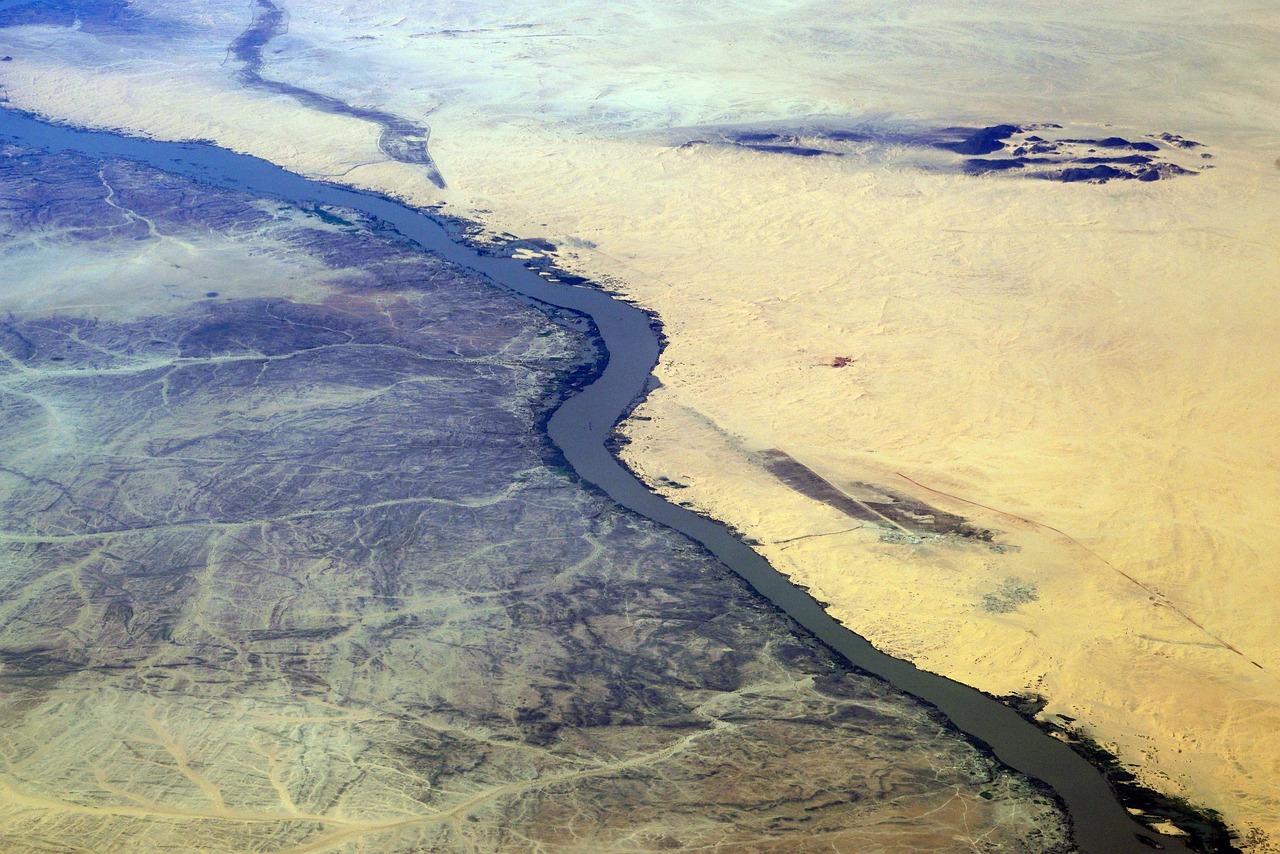By Firas KONDAKJI, under the supervision of the President of the AISP/SPIA, Mr. Laurent Attar-Bayrou.

Donald Trump, Benjamin Netanyahu, Abdullatif Al-Zayani, and Abdullah bin Zayed Al Nahyan, Tuesday, September 15, at the White House. SAUL LOEB / AFP
On August 13, Israel and the United Arab Emirates (UAE) declared their intention to normalise diplomatic and economic relations. Israeli Prime Minister Benjamin Netanyahu welcomed a “full and formal peace” between the two states. A month later, on September 15, the UAE, Bahrain, and Israel met at the White House to conclude the Abraham Accords, which will normalise relations between the two Gulf monarchies on one side and Israel on the other. In this context, President Trump, whose administration acted as mediator, boasted of a “spectacular breakthrough.” These agreements are not in line with the traditional policy that the Arab League states have pursued with their Hebrew neighbour. While Egypt and Jordan signed peace agreements with Israel in 1979 and 1994, respectively, in order to turn the page on a history of conflict, the UAE’s agreement is not shared by all. The question remains: what are the motives and consequences of this agreement, known as the “Abraham Accords”?
Since its creation on May 14, 1948, the history of the State of Israel with its closest Arab neighbors has been one of war and cold peace. Although Israel has embarked on a peaceful path with Egypt and Jordan, this peace has not led to real and concrete relations between the peoples of these states. In fact, it was more of an armistice than a complete normalization. However, the wishes of the new friends seem to be oriented toward strong relations at all levels. This is without completely neglecting the Palestinian conflict.
Under this agreement, the Emiratis are pleased to have stopped the State of Israel from annexing large parts of the West Bank in Palestine. However, the Israeli Prime Minister made a statement more in line with the aspirations of his far-right supporters, saying that the annexation had only been “postponed,” but “not abandoned.” [i] As a result, the Palestinians felt betrayed by this political initiative, which could dethrone their cause from its position as the “central cause” of the Arab League states. However, despite Netanyahu’s remarks, Minister of State for Foreign Affairs Anwar Gargash reassured himself by saying that a distinction must be made between “the commitments of a state and political announcements.” [ii] On the other hand, the UAE’s strongman, Crown Prince Mohammed bin Zayed, otherwise known by his initials MBZ, said that if the State of Israel did not respect its commitments to stop the annexation of the West Bank, the Emiratis would be prepared to withdraw from the agreement. [iii] This statement has enormous consequences for future relations between the two countries, given Netanyahu’s commitment to annex these territories. It is an important opportunity to be seized before the end of Trump’s term in November.
For some observers, however, this agreement comes as no surprise and does not reflect a desire to resolve the Israeli-Palestinian conflict. Indeed, relations between the UAE and Israel already exist as a result of the Oslo Accords of 1993. [iv] Although these are not high-level state relations, the two countries have cooperated in several areas, including intelligence. In February 2019, a video flooded the media concerning a meeting between the foreign ministers of Israel, the United Arab Emirates, Saudi Arabia, and two other Gulf states. The aim was not to agree on the best way to resolve the Palestinian dilemma, as they were absent, but to reflect on how to deal with their common enemy, Iran. This is in line with the policy of the Gulf states, which see Iran, not Israel, as the primary threat to their interests. This view is shared by Israel, as the heir to the Persian Empire continues to express its desire to destroy the “Zionist entity.” Iran has already described the agreement as “strategic stupidity.” [v] Following the meeting, Netanyahu’s former National Security Advisor Dore Gold clarified that “Cooperation in different ways and at different levels is not necessarily visible above the surface, but what lies beneath the surface is much greater than anywhere else.” [vi]. Added to this is the need to deal with the aspirations of Turkey, the sponsor of the Muslim Brotherhood in the region, which is MBZ’s fierce enemy. Therefore, the agreement reached is not necessarily aimed at making peace, but rather at confronting and containing the common adversaries of the three signatory countries, namely the expansionist powers of Iran and Turkey and their agents in the region. Furthermore, this agreement does not provide for any means of pressure on Israel to end its conflict with the Palestinians, apart from the vague phrase stating that the two states are committed to working together “to achieve a negotiated solution to the Israeli-Palestinian conflict that meets the legitimate needs and aspirations of both peoples, and to advance peace, stability, and prosperity in the Middle East.”
However, economic interests remain the main focus of these agreements. Reading through the terms of these agreements, it is clear that the signatories have placed great importance on their future economic relations, as they cover almost all aspects of economic life, such as finance, tourism, and civil aviation. It should be remembered that there is strong interest on the part of the UAE and Bahrain in forging links with Israel, the Middle East’s “tech hub.” Indeed, Israel is a significant power in the field of cybertechnology and possesses capabilities that can serve these monarchies, which are preoccupied with the spread of the so-called “Arab Spring” across their territories. This is particularly true in Bahrain, where regional intervention by its neighbours was necessary to end the mobilization of the Shiite majority population on its territory in 2011. This desire to forge close economic ties is part of MBZ’s aspiration to make the UAE a “global player” in the region. [viii] This necessarily requires the kingdom, which overlooks the strategic Strait of Hormuz, to break the Arab consensus that was reached in 2002 on the initiative of the Saudi Crown Prince at the time, King Abdullah. Indeed, MBZ seems to be completely abandoning the “Abdullah Plan,” which establishes an Arab consensus on normalizing relations with the State of Israel. [ix] This plan stated that an end to the conflict and peace with Israel would only be considered between the Arab League states and Israel in the event of a “complete withdrawal from the occupied Arab territories, including the Syrian Golan Heights, to the line of June 4, 1967, and the territories still occupied in southern Lebanon.” [x] That being said, the Emiratis are seeking to pursue their own foreign policy while distancing themselves from the policy of the Arab League states. [xi] In addition, it is in Israel’s interest to link its economy with a major global investment center such as the UAE. However, it fears that this agreement will not yield promising results, since relations between Arab states that have already concluded peace agreements with Israel remain cold and very weak at the economic level.
It is true that it is not clear whether these relations will lead to relations between the populations of the two countries. It should be remembered that there are political relations at the state level between Israel and Egypt and Jordan, but cultural and economic relations are very weak. However, the context in which the Emirates find themselves is different from that of their Arab counterparts. Indeed, the Emirates have never been at war with the State of Israel and have a much smaller population, which could make relations between the two new friends more accessible. Added to this is what Gargash recalled about the history of these two countries. According to the latter: “We have no borders with Israel, we have no Israeli settlements or refugees. This can only be more constructive in achieving peace. We therefore see this normalization as a warm peace between our two countries.” These words reflect a harsh political reality that undoubtedly affects Palestinians, who see themselves as abandoned by their Arab brothers. However, can such normalization be generalized across all Arab states?
These peace agreements require anticipating the reaction of one of the most important players in Arab states’ policy toward Israel, namely Saudi Arabia. When asked to comment on Saudi Arabia’s opinion on this subject, Gargash stated that no consultation had been held with Arab countries in order to avoid “embarrassing” them. In saying this, Gargash wishes to indicate that Saudi Arabia was not aware of these agreements. Indeed, he stated that Saudi Arabia’s decision in this regard is “sovereign,” while pointing out that the Saudi media has been very supportive of the Emiratis in their initiative. “We acted for ourselves and are not a model for anyone,” he added. However, the small kingdom of Bahrain is dependent on its big brother Saudi Arabia, and it seems absurd to say that the Saudis were not aware of, or even supportive of, this normalization. This contradicts the idea that the normalization of relations between the guardian of Islam’s holy sites and Israel would happen sooner or later. However, one month after these agreements, on Wednesday, October 14, Israel announced “the construction of 2,166 homes in West Bank settlements.” This raises the question of how the new peacemakers, the UAE and Bahrain, will react. However, as far as peace and the lives of Palestinians in their occupied territories are concerned, their future remains uncertain as long as Israel feels free to violate their rights and international law by establishing these settlements.
[i] Par Marie Boyer et Stéphane Amar, correspondant en Israël Le 14 août 2020 à 15h00, et Modifié Le 15 Août 2020 À 07h26, « Cinq minutes pour comprendre l’accord «historique» entre Israël et les Emirats arabes unis », leparisien.fr, 14 août 2020, https://www.leparisien.fr/international/cinq-minutes-pour-comprendre-l-accord-historique-entre-israel-et-les-emirats-arabes-unis-14-08-2020-8367912.php.
[ii] Armin Arefi, « Anwar Gargash : « Face à Israël, la politique de la chaise vide n’a pas fonctionné » », Le Point, 15 septembre 2020, https://www.lepoint.fr/monde/anwar-gargash-une-paix-chaude-entre-les-emirats-arabes-unis-et-israel-15-09-2020-2391906_24.php.
[iii] Louis Imbert, « Rapprochement historique entre Israël et les Emirats arabes unis », Le Monde.fr, 14 août 2020, https://www.lemonde.fr/international/article/2020/08/14/l-accord-d-abraham-un-rapprochement-historique-entre-israel-et-les-emirats-arabes-unis_6048922_3210.html.
[iv] Amar, à 15h00, et À 07h26, « Cinq minutes pour comprendre l’accord «historique» entre Israël et les Emirats arabes unis ».
[v] Amar, à 15h00, et À 07h26.
[vi] Ian Black, « Why Israel is quietly cosying up to Gulf monarchies », the Guardian, 19 mars 2019.
[vii] T. O. I. staff, « Full Text of the ‘Treaty of Peace’ Signed by Israel and the United Arab Emirates », 16 September 2020, The Times of Israel édition, https://www.timesofisrael.com/full-text-of-the-treaty-of-peace-signed-by-israel-and-the-united-arab-emirates/.
[viii] Arefi, « Anwar Gargash ».
[ix] Imbert, « Rapprochement historique entre Israël et les Emirats arabes unis ».
[x] « Text: Beirut Declaration », 28 mars 2002, http://news.bbc.co.uk/2/hi/world/monitoring/media_reports/1899395.stm.
[xi] Michael Crowley, « Israel, U.A.E. and Bahrain Sign Accords, With an Eager Trump Playing Host », The New York Times, 15 September 2020, sect. U.S., https://www.nytimes.com/2020/09/15/us/politics/trump-israel-peace-emirates-bahrain.html.
[xii] Arefi, « Anwar Gargash ».

